
Children are entitled to a full time education which is suitable to their age, ability, aptitude and any special educational needs they may have and we will endeavour to encourage the children to attend, and to put in place appropriate procedures to support regular attendance. We believe that the most important factor in promoting good attendance is the development of positive attitudes towards school. To this end, we strive to make our school a happy and rewarding experience for all children.
There is a relationship between attendance of pupils and their development, attainment and progress.
Darwen St James Academy is committed to promoting good attendance as part of its dedication to ensure quality educational provision to give its pupils the best possible start in life.
If your child is unable to attend school due to illness please let the school office know before 8.45am.
Miss Peckson is responsible for monitoring attendance and, along with Miss Evans, our Pupil Wellbeing Coordinator and Mrs Murray our School Admin officer, we contact parents of any child whose attendance or time keeping is causing us concern.
The Attendance team work closely with parents to support them in enabling their children to have good attendance. We aim for every child to have attendance at least the national average of 95%.
Please ensure that your child arrives at school punctually. Your child will be considered to be late if they arrive after 8.55am.
There is new Government guidance called Working together to improve Attendance - please use the link here to read this document - https://www.gov.uk/government/publications/working-together-to-improve-school-attendance
The Government issued new regulations in September 2013 regarding Leave of Absence; The Education (Pupil Regulations) (England) Regulations 2006 as amended by Education (Pupil Regulations) (England) (Amendment) Regulations 2013. View the Governments attendance and absence information here.
Headteachers shall not grant any Leave of Absence during term time unless they consider there are exceptional circumstances relating to the application.
Parents do not have any entitlement to take their children on holiday during term time.
The school can only consider applications for Leave of Absence which are made by the resident parent. i.e the parent with whom the child normally resides.
Applications for Leave of Absence must be made in advance and failure to do so will result in the absence being recorded as “unauthorised”. This may result in legal action against the parent/ carer, by way of a Fixed Penalty Notice.
To apply for a leave of absence please complete the holiday request form, if appropriate, and make an appointment to meet with the headteacher.
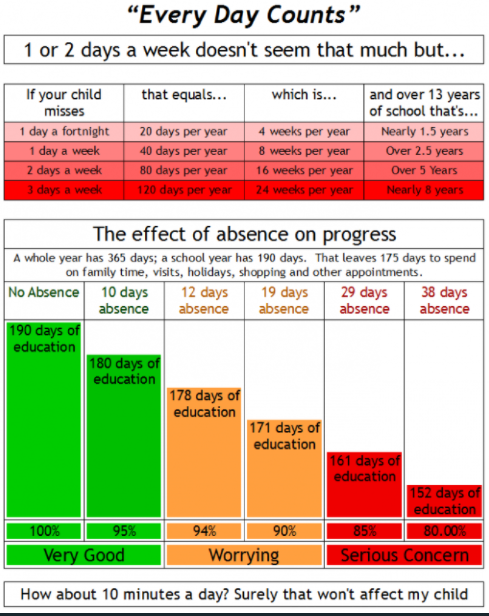
It can be tricky deciding whether or not to keep your child off school, nursery or playgroup when they're unwell.
There are government guidelines for schools and nurseries about managing specific infectious diseases at GOV.UK. These say when children should be kept off school and when they shouldn't.
If you do keep your child at home, it's important to phone the school or nursery on the first day. Let them know that your child won't be in and give them the reason.
If your child is well enough to go to school but has an infection that could be passed on, such as a cold sore or head lice, let their teacher know.
What to do about other conditions
High temperature
If your child has a high temperature, keep them off school until it goes away.
Feeling anxious or worried
It's normal for children to feel a little anxious sometimes. They may get a tummy ache or headache, or have problems eating or sleeping.
Avoiding school can make a child's anxiety about going to school worse. It's good to talk about any worries they may have such as bullying, friendship problems, school work or sensory problems. You can also work with the school to find ways to help them.
If your child is still struggling and it's affecting their everyday life, it might be good to talk to your GP or school nurse.
Find information and advice about how to help children with anxiety
Coughs and colds
It's fine to send your child to school with a minor cough or common cold. But if they have a fever, keep them off school until the fever goes.
Encourage your child to throw away any used tissues and to wash their hands regularly.
Chickenpox
If your child has chickenpox, keep them off school until all the spots have crusted over.
This is usually about 5 days after the spots first appeared.
Cold sores
There's no need to keep your child off school if they have a cold sore.
Encourage them not to touch the blister or kiss anyone while they have the cold sore, or to share things like cups and towels.
Conjunctivitis
You don't need to keep your child away from school if they have conjunctivitis.
Do get advice from your pharmacist. Encourage your child not to rub their eyes and to wash their hands regularly.
COVID-19
If your child has mild symptoms, such as a runny nose, sore throat, or slight cough, and feels well enough, they can go to school.
Your child should try to stay at home and avoid contact with other people if they have symptoms of COVID-19 and they either:
- have a high temperature
- do not feel well enough to go to school or do their normal activities
What to do if your child has tested positive
Your child is no longer required to do a COVID-19 rapid lateral flow test if they have symptoms. But if your child has tested positive for COVID-19, they should try to stay at home and avoid contact with other people for 3 days after the day they took the test.
Ear infection
If your child has an ear infection and a high temperature or severe earache, keep them off school until they're feeling better or their high temperature goes away.
Hand, foot and mouth disease
If your child has hand, foot and mouth disease but seems well enough to go to school, there's no need to keep them off.
Encourage your child to throw away any used tissues straight away and to wash their hands regularly.
Head lice and nits
There's no need to keep your child off school if they have head lice.
You can treat head lice and nits without seeing a GP.
Impetigo
If your child has impetigo, they'll need treatment from a pharmacist or GP, often with antibiotics.
Keep them off school until all the sores have crusted over and healed, or for 48 hours after they start antibiotic treatment.
Encourage your child to wash their hands regularly and not to share things like towels and cups with other children at school.
Measles
If your child has measles, they'll need to see a GP. Call the GP surgery before you go in, as measles can spread to others easily.
Keep your child off school for at least 4 days from when the rash first appears.
They should also avoid close contact with babies and anyone who is pregnant or has a weakened immune system.
Ringworm
If your child has ringworm, see your pharmacist unless it's on their scalp, in which case you should see a GP.
It's fine for your child to go to school once they have started treatment.
Scarlet fever
If your child has scarlet fever, they'll need treatment with antibiotics from a GP. Otherwise they'll be infectious for 2 to 3 weeks.
Your child can go back to school 24 hours after starting antibiotics.
Slapped cheek syndrome (fifth disease)
You don't need to keep your child off school if they have slapped cheek syndrome because, once the rash appears, they're no longer infectious.
But let the school or teacher know if you think your child has slapped cheek syndrome.
Sore throat
You can still send your child to school if they have a sore throat. But if they also have a high temperature, they should stay at home until it goes away.
A sore throat and a high temperature can be symptoms of tonsillitis.
Threadworms
You don't need to keep your child off school if they have threadworms.
Speak to your pharmacist, who can recommend a treatment.
Vomiting and diarrhoea
Children with diarrhoea or vomiting should stay away from school until they have not been sick or had diarrhoea for at least 2 days (48 hours).
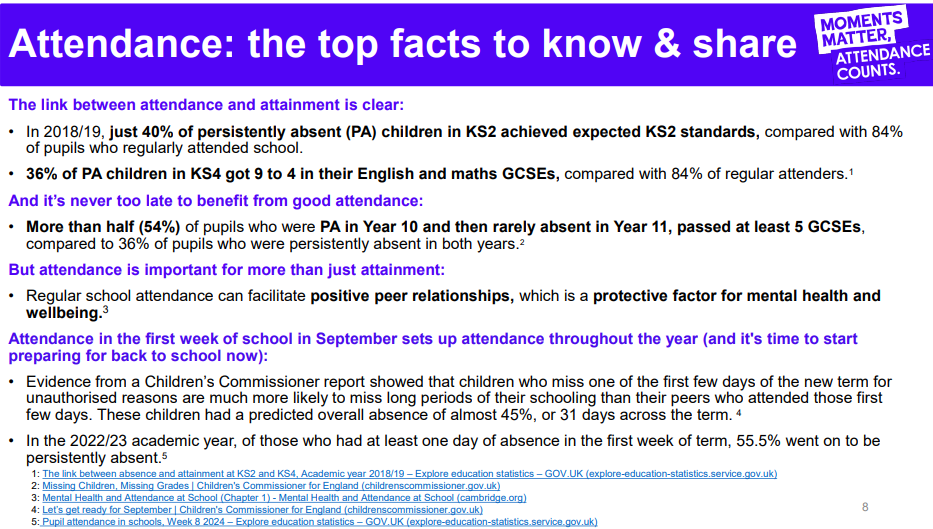

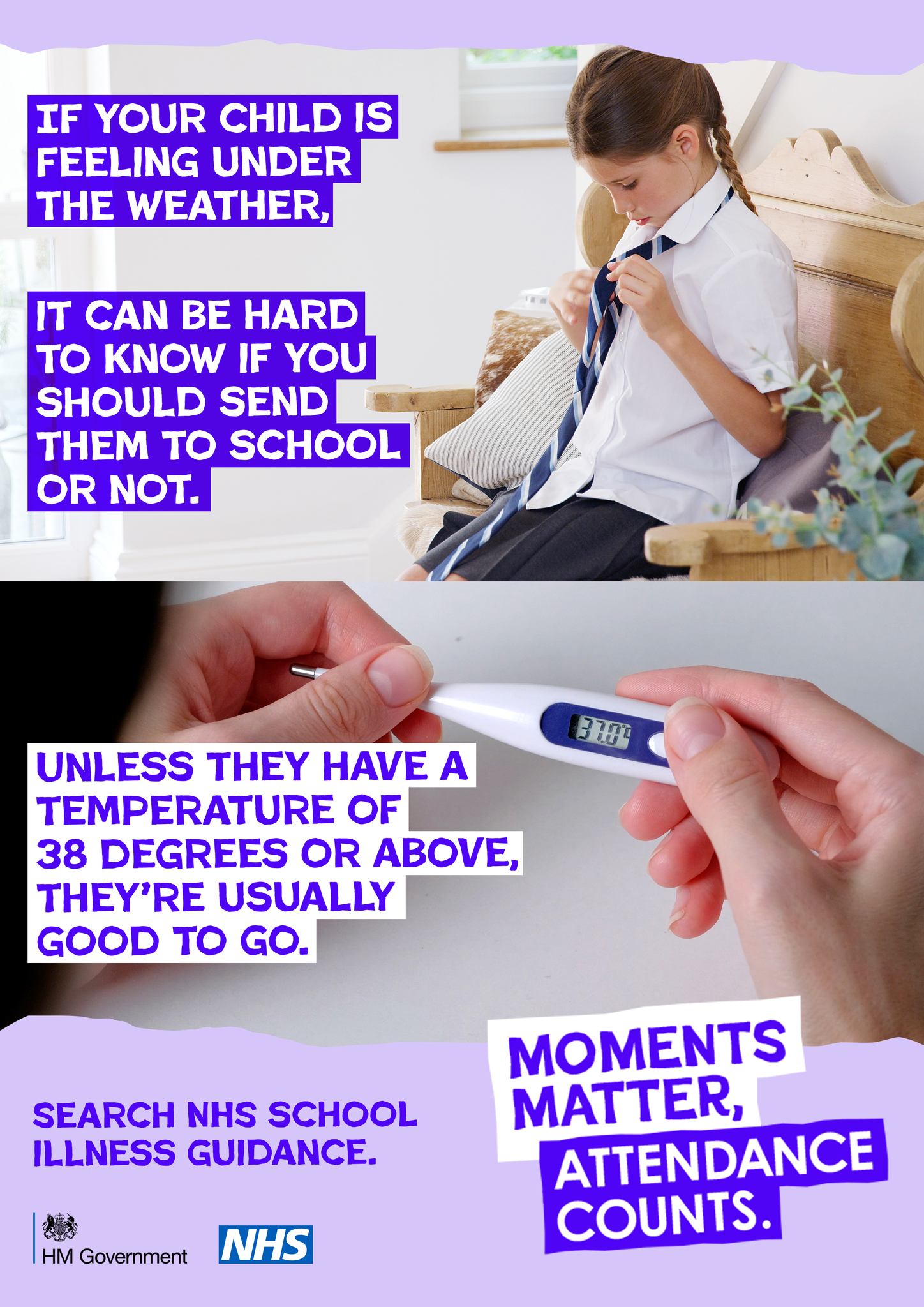

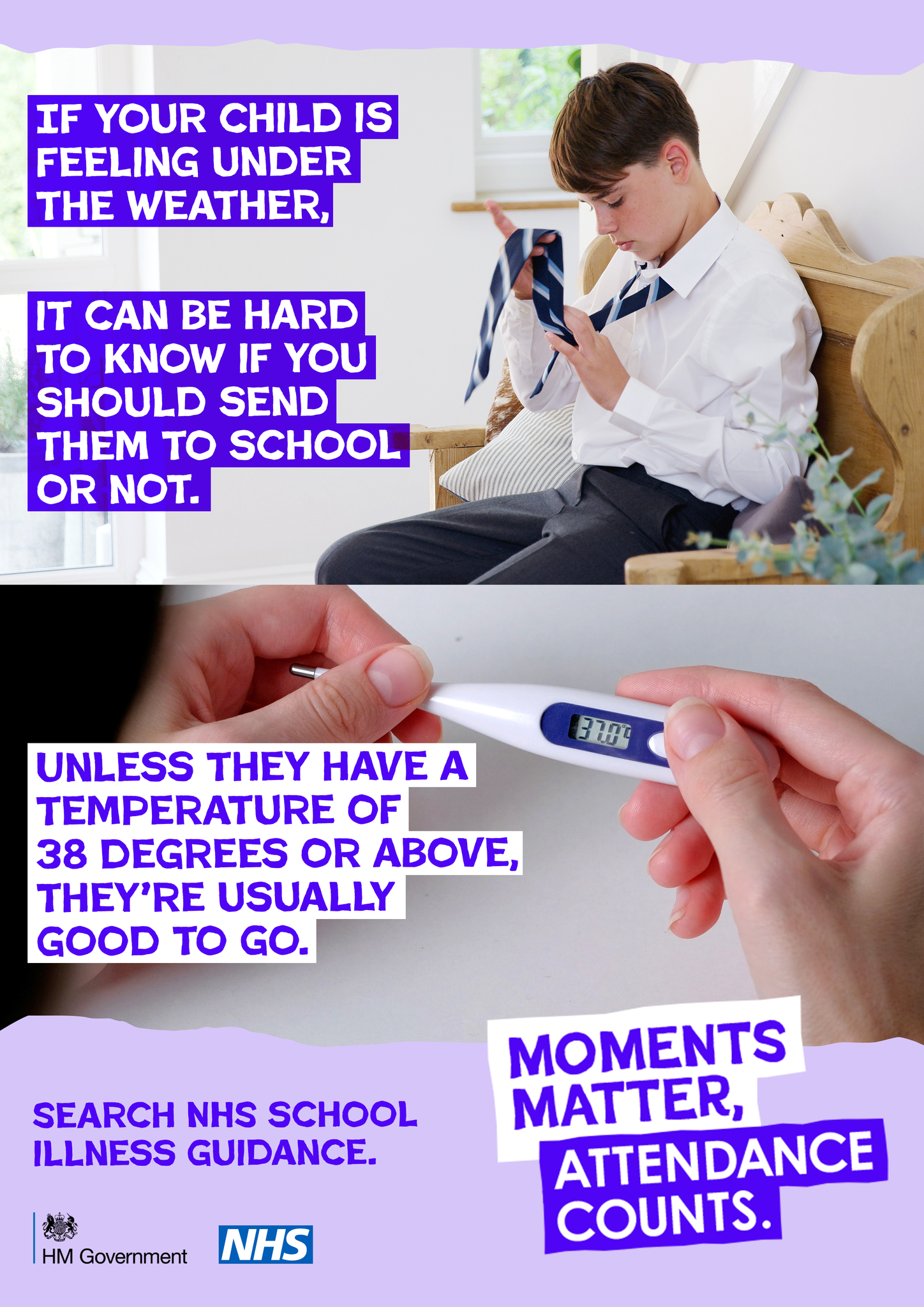

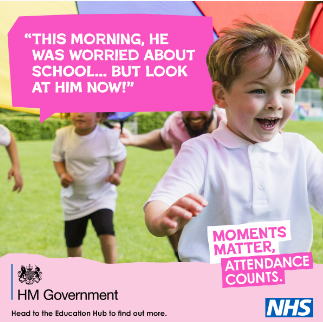

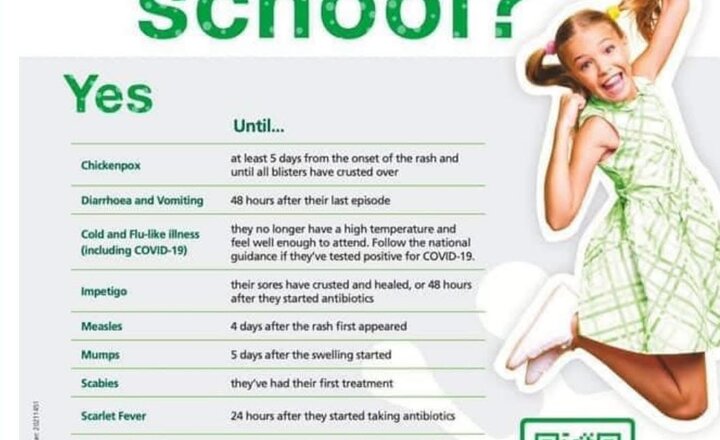

.png)

